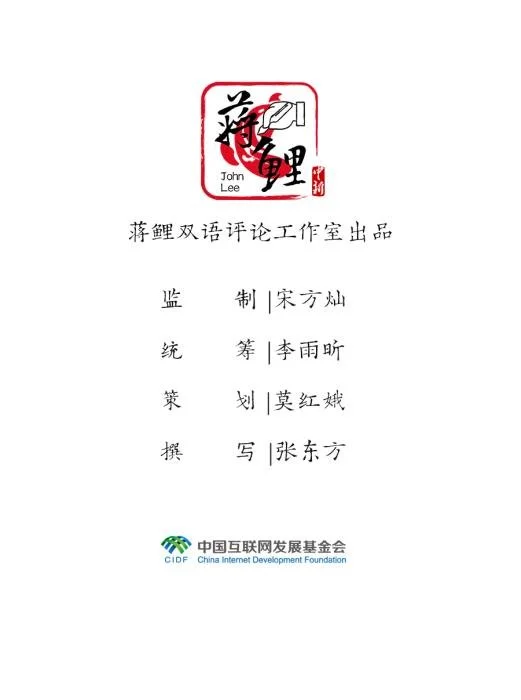7 c. Q. _0 L+ M$ K8 d3 Q$ @
# W0 m7 u1 H9 O
[backcolor=rgba(96, 96, 96, 0.8)]Loaded: 58.88%) V0 G# ~/ ?" j
/ j. l" Y7 H3 \. Q, s5 h% {
9 g, K0 M5 X: |+ s: |8 t
. |8 o* i9 H( U+ a/ K
5 @$ e. _: a! p
% n( z3 [& C4 M( ]6 c) E
Picture-in-PicturePause[size=1em]Current Time 0:16
7 |( Q* {9 h( z1 R[size=1em]/
" D, m+ G- F4 i6 k( U5 ~; u4 z
9 U" f- e7 Q0 S1 L h( u[size=1em]Duration 1:36
0 f8 ?% @6 R z/ z# o
8 J- E5 h) Q' e
FullscreenMute[backcolor=rgba(115, 133, 159, 0.5)]- d2 G0 G9 ^$ ~* h. {1 M- z
( o; A# W' \; Y) \8 v1 r$ b5 A5 Q+ k
3 d; [5 o: Y$ L7 F5 L
" _& M3 R2 ~; c" E! ?4 i. G
% n9 m+ y6 `6 W+ l3 N3 u4 s5 T
" Q# V* J+ Z: C4 V6 I' x! P- j
3 m% N% |, H6 W7 L
1 ^( q! e* G- ]% M8 _4 D3 q
$ X" Z+ g8 a& D6 b; |0 T. r6 u0 m
自动播放1 v6 Z( O0 T( a8 t
中新网北京12月1日电 (蒋鲤)加拿大政府近日发布了一份山寨美国版“印太战略”,声称“在存在深刻分歧的领域,我们将挑战中国”。
这份26页的战略文件,不仅大肆对中国攻击抹黑,渲染所谓“中国威胁”,更在涉台、涉疆、涉港、人权等问题上粗暴干涉中国内政。
之前,美国推行所谓“印太战略”,美其名曰要和盟友一起打造自由开放、联通、繁荣、安全、有韧性的“印太”地区,真正目的则是遏制中国,维护其在该地区的霸权,充斥着冷战思维。
同样,加拿大这份“印太战略”也充斥着地缘政治色彩和意识形态偏见,和美国版“印太战略”如出一辙。不难看出,这份文件是在为美国摇旗呐喊,凸显了其跟随美国遏制和围堵中国的意图。
但近年来,加拿大与印太地区国家经贸合作进展寥寥,有限的投入使其外交方面在该地区更难以形成影响,妄图通过“印太战略”增强自己在该地区的话语权,甚至“遏制中国”,显得自不量力。
俄罗斯科学院美国和加拿大研究所首席研究员叶莲娜·科姆科娃表示,加拿大并非亚太地区的深度军事政治参与者,至少目前还不是。它的所谓新战略首先是为了完成美国的政治使命。
2021年12月,美国驻加拿大大使大卫·科恩刚刚上任就表态称,美国希望加拿大有一个明确的亚太地区战略,并确定中国在其中的位置。如今,加版“印太战略”刚发布,美国驻加大使科恩就在第一时间发声明表示“满意”,印证了该国外交战略对美国的从属地位。
此前,美国总统拜登在所谓“印太地区”推出美日印澳“四方安全对话”、美英澳AUKUS三边安全协议等,而加拿大作为“五眼联盟”成员却被排除在外。
为了不被美国等盟友边缘化,加拿大通过“印太战略”向美国发出信号,表明它仍然是美国在包括政治、经济等所有领域对抗中国的盟友。然而,即便美国也无法彻底和中国脱钩,但加拿大却急于向美国“送人头”,恐怕难以得到好处。
加拿大广播公司(CBC)的报道称,该战略使用了一些“令人惊讶的直白语言”,加拿大政府需要对中国在远东和其他地区的目标保持“清醒的头脑”。
中加之间既没有重大利害冲突,也没有地缘政治矛盾,将中国视作威胁可谓荒唐。中加双方需要对话,而非对抗。
如果加拿大政府真要对中国保持“清醒的头脑”,就要独立思考,不被美国意志左右,在对外战略上争取更多的自主权。秉持冷战思维、挑动集团政治和阵营对抗的做法不得人心,也势必会伤及自身利益。

Canada needs independent thinking before imitating U.S. intervention in Indo-Pacific
By John Lee
(ECNS) -- The Canadian government released an Indo-Pacific Strategy imitating the U.S. in which the country stated that “In areas of profound disagreement, we will challenge China.”
The Canadian government slandered China, propagated “the China threat”, and interfered in China’s internal affairs on issues like Taiwan, Xinjiang, Hong Kong, and human rights in this 26-page document.
Like the U.S.’ Indo-Pacific Strategy, which claims to build an “open, connected, prosperous, resilient, and secure Indo-Pacific region” but in fact targets China and tries to maintain hegemony in this region, the Canadian edition is also fraught with geopolitical implications and ideological prejudice. It shows Canada is determined to stand with the U.S. to contain China.
However, Canada has made little progress in economic and trade cooperation with the countries in the so-called Indo-Pacific region in recent years and less efforts to maintain diplomatic relations with regional countries, making it hard to reinforce its local influence. Attempts to strengthen its voice in the region through this strategy and even to curb China seems to be overreaching.
Canada is not an experienced participant in military and political affairs in the Asia-Pacific region, at least not yet. Its so-called new strategy seeks first to accomplish the political mission of the U.S., said Elena G. Komkova, leading Researcher of the Institute for the U.S. and Canadian Studies of the Russian Academy of Sciences.
In December 2021, U.S. Ambassador to Canada David Cohen stated that the U.S. hoped Canada would deploy a clear Asia-Pacific strategy and determine China's position in it as he took office. After the strategy launch, Cohen issued a statement saying "welcome" to it immediately.
Previously, the U.S., Japan, India, and Australia re-launched the Quadrilateral Security Dialogue, while the U.S., Britain and Australia announced a security pact dubbed "AUKUS". Canada, a member of the Five Eyes alliance, was excluded from these security partnerships.
Therefore, to avoid marginalization by the U.S. and other allies, it issued the strategy to tell the U.S. it is still reliable in politics, economy, and other fields to resist China. However, even the U.S. can hardly decouple with China. Will an obsequious strategy help the Canadian government gain what it wants?
Using some surprisingly blunt language, the strategy says the Canadian government needs to be "clear-eyed" about China's objectives in the Far East and elsewhere, said a CBC report.
There is no major interest conflicts or geopolitical contradiction between China and Canada so it is absurd to regard China as a threat. Both sides need dialogue, not confrontation.
If the Canadian government really wants to be "clear-eyed" about China, it must think independently and get rid of the will of the U.S. to strive for more independence in foreign strategies.
Adhering to the Cold War mentality and inciting bloc politics or camp confrontation is unpopular, and is bound to hurt its own interests.

2 T7 g0 M0 }% K+ P& |5 w